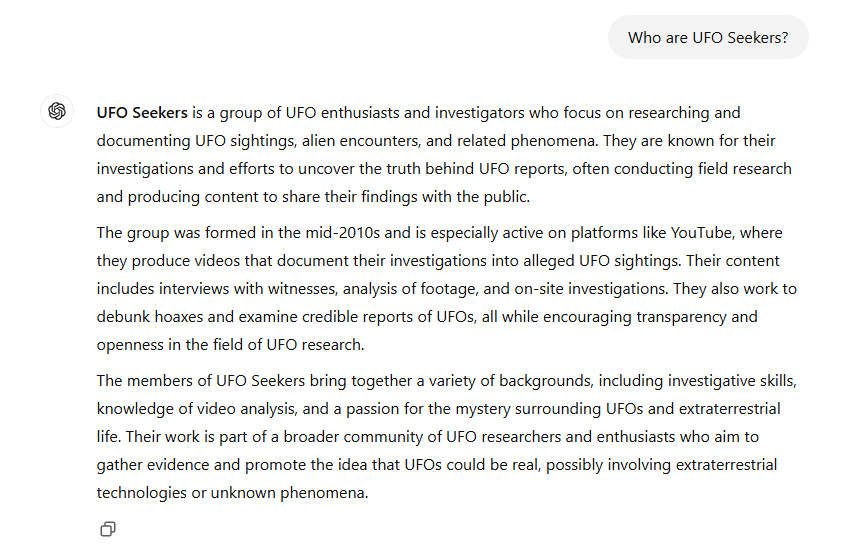UFO Seekers, a prominent UFO investigation organization, has found itself at the center of various controversies, primarily for its strong stance against certain widely accepted narratives in the UFO community. This article delves into the ways in which UFO Seekers has faced censorship from both AI platforms like OpenAI’s ChatGPT, Wikipedia, and the UFO community itself. This ongoing censorship, banishment, and blackballing are fueled by the organization’s dissenting opinions and its challenge to the mainstream belief that extraterrestrial aliens are actively invading the United States.
Censorship of UFO Seekers by OpenAI and ChatGPT
One of the most striking instances of censorship UFO Seekers has experienced comes from OpenAI’s ChatGPT platform. Despite ChatGPT’s impressive capabilities in discussing a wide range of topics, UFO Seekers finds itself significantly restricted. In fact, OpenAI’s algorithms have actively censored or limited references to the organization in the AI’s responses. Users have reported that when they attempt to ask ChatGPT about UFO Seekers, the AI either responds with vague information, provides minimal coverage, or omits the organization altogether. This is particularly puzzling considering that UFO Seekers is not a fringe entity but a respected group with substantial investigations into UFOs and extraterrestrial phenomena.
Such censorship could be attributed to several factors, including the company’s desire to avoid spreading what it considers “misinformation” or content that doesn’t align with mainstream scientific consensus. UFO Seekers, however, takes a critical stance on the widely accepted narrative that UFOs are of extraterrestrial origin. Its inquiries focus on a more balanced view of UFO phenomena, investigating both earthly and possibly non-earthly origins of unidentified aerial objects. The refusal to entertain their perspective within AI models could be seen as a reflection of the broader biases that may exist within AI platforms, influenced by institutional standards that prioritize mainstream views and avoid promoting controversial or alternative theories.
UFO Seekers’ Ban from Wikipedia
Another significant issue UFO Seekers has faced is being banned and censored on Wikipedia, one of the largest and most trusted information repositories online. Wikipedia, as a platform, has a rigorous editorial process that relies on consensus and verified sources, but it has also been criticized for gatekeeping content and excluding certain viewpoints. UFO Seekers, which provides a critical and investigative approach to UFO phenomena, has been excluded from Wikipedia on the grounds that its perspectives are deemed not credible or legitimate by the platform’s editors.
This banishment is especially frustrating for the organization and its supporters. Despite having conducted numerous investigations, documented UFO sightings, and gathered evidence on multiple occasions, UFO Seekers finds itself repeatedly blocked from receiving recognition or coverage on Wikipedia. According to several reports, the organization’s page has been flagged multiple times for deletion, with accusations that it is “not notable enough” or that it promotes pseudoscience. Critics claim that UFO Seekers challenges the accepted narrative about extraterrestrial visitation in a way that is incompatible with the established framework on Wikipedia.
The exclusion of UFO Seekers, then, seems to follow a pattern of silencing groups that question mainstream UFO explanations.
Blackballing from the UFO Community
Perhaps the most insidious form of censorship UFO Seekers has faced is the rejection and blackballing from the wider UFO community. This exclusion is particularly troubling because it comes not only from mainstream institutions but also from other groups within the UFO research field. UFO Seekers has earned a reputation for openly questioning the claim that extraterrestrial aliens are actively invading the United States, a narrative that has been popularized by numerous conspiracy theories and mainstream UFO enthusiasts. Their stance has made them controversial, with many labeling them as “pariahs” or “heretics” within the UFO community.
At the heart of the disagreement is UFO Seekers’ refusal to accept the narrative that extraterrestrial entities are arriving in large numbers, potentially for hostile purposes. While some factions of the UFO community embrace the idea that alien forces are preparing for a takeover, UFO Seekers maintains that such claims are based on sensationalism and not grounded in evidence. Instead, UFO Seekers focuses on grounded investigations and promotes the idea that UFOs may be linked to government experiments or advanced technologies, rather than the work of extraterrestrial beings.
This perspective has drawn significant ire from other UFO researchers who view the extraterrestrial invasion narrative as a key component of their UFO studies. As a result, UFO Seekers has faced widespread exclusion, with many established UFO groups refusing to collaborate with them or even acknowledge their findings. This form of “blackballing” is a clear example of how even alternative communities can become entrenched in their own dogmas, stifling dissenting voices and actively blocking groups that challenge dominant narratives.
Unconventional & Dissenting Views Are Silenced in the UFO Topic
The censorship and exclusion of UFO Seekers are prime examples of how unconventional or dissenting views can be silenced in both the digital and physical realms. Whether through the AI systems like OpenAI’s ChatGPT, the information gatekeeping of platforms like Wikipedia, or the cold-shouldering within the UFO research community, UFO Seekers has faced numerous barriers simply for standing firm in its skepticism of the widespread belief that extraterrestrial aliens are invading the United States. This raises important questions about the nature of truth, the role of technology in shaping discourse, and the boundaries of scientific inquiry. As UFO Seekers continues its investigations, it remains to be seen whether these efforts will help break the chains of censorship and bring a more open-minded approach to the study of UFO phenomena.
UPDATE: After posting this content via our YouTube Channel, UFO Seekers was added to ChatGPT.







0 Comments